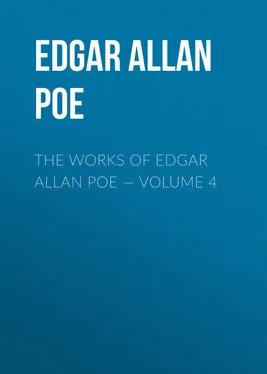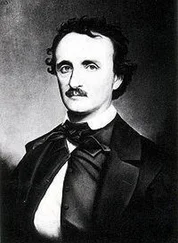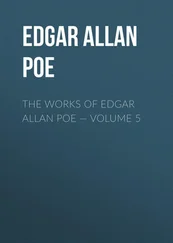Edgar Poe - The Works of Edgar Allan Poe — Volume 4
Здесь есть возможность читать онлайн «Edgar Poe - The Works of Edgar Allan Poe — Volume 4» — ознакомительный отрывок электронной книги совершенно бесплатно, а после прочтения отрывка купить полную версию. В некоторых случаях можно слушать аудио, скачать через торрент в формате fb2 и присутствует краткое содержание. Жанр: literature_19, foreign_antique, foreign_prose, на английском языке. Описание произведения, (предисловие) а так же отзывы посетителей доступны на портале библиотеки ЛибКат.
- Название:The Works of Edgar Allan Poe — Volume 4
- Автор:
- Жанр:
- Год:неизвестен
- ISBN:нет данных
- Рейтинг книги:3 / 5. Голосов: 1
-
Избранное:Добавить в избранное
- Отзывы:
-
Ваша оценка:
- 60
- 1
- 2
- 3
- 4
- 5
The Works of Edgar Allan Poe — Volume 4: краткое содержание, описание и аннотация
Предлагаем к чтению аннотацию, описание, краткое содержание или предисловие (зависит от того, что написал сам автор книги «The Works of Edgar Allan Poe — Volume 4»). Если вы не нашли необходимую информацию о книге — напишите в комментариях, мы постараемся отыскать её.
The Works of Edgar Allan Poe — Volume 4 — читать онлайн ознакомительный отрывок
Ниже представлен текст книги, разбитый по страницам. Система сохранения места последней прочитанной страницы, позволяет с удобством читать онлайн бесплатно книгу «The Works of Edgar Allan Poe — Volume 4», без необходимости каждый раз заново искать на чём Вы остановились. Поставьте закладку, и сможете в любой момент перейти на страницу, на которой закончили чтение.
Интервал:
Закладка:
These repeated insults were not to be endured by an imperious nobility. Such invitations became less cordial — less frequent — in time they ceased altogether. The widow of the unfortunate Count Berlifitzing was even heard to express a hope “that the Baron might be at home when he did not wish to be at home, since he disdained the company of his equals; and ride when he did not wish to ride, since he preferred the society of a horse.” This to be sure was a very silly explosion of hereditary pique; and merely proved how singularly unmeaning our sayings are apt to become, when we desire to be unusually energetic.
The charitable, nevertheless, attributed the alteration in the conduct of the young nobleman to the natural sorrow of a son for the untimely loss of his parents — forgetting, however, his atrocious and reckless behavior during the short period immediately succeeding that bereavement. Some there were, indeed, who suggested a too haughty idea of self-consequence and dignity. Others again (among them may be mentioned the family physician) did not hesitate in speaking of morbid melancholy, and hereditary ill-health; while dark hints, of a more equivocal nature, were current among the multitude.
Indeed, the Baron’s perverse attachment to his lately-acquired charger — an attachment which seemed to attain new strength from every fresh example of the animal’s ferocious and demon-like propensities — at length became, in the eyes of all reasonable men, a hideous and unnatural fervor. In the glare of noon — at the dead hour of night — in sickness or in health — in calm or in tempest — the young Metzengerstein seemed rivetted to the saddle of that colossal horse, whose intractable audacities so well accorded with his own spirit.
There were circumstances, moreover, which coupled with late events, gave an unearthly and portentous character to the mania of the rider, and to the capabilities of the steed. The space passed over in a single leap had been accurately measured, and was found to exceed, by an astounding difference, the wildest expectations of the most imaginative. The Baron, besides, had no particular name for the animal, although all the rest in his collection were distinguished by characteristic appellations. His stable, too, was appointed at a distance from the rest; and with regard to grooming and other necessary offices, none but the owner in person had ventured to officiate, or even to enter the enclosure of that particular stall. It was also to be observed, that although the three grooms, who had caught the steed as he fled from the conflagration at Berlifitzing, had succeeded in arresting his course, by means of a chain-bridle and noose — yet no one of the three could with any certainty affirm that he had, during that dangerous struggle, or at any period thereafter, actually placed his hand upon the body of the beast. Instances of peculiar intelligence in the demeanor of a noble and high-spirited horse are not to be supposed capable of exciting unreasonable attention — especially among men who, daily trained to the labors of the chase, might appear well acquainted with the sagacity of a horse — but there were certain circumstances which intruded themselves per force upon the most skeptical and phlegmatic; and it is said there were times when the animal caused the gaping crowd who stood around to recoil in horror from the deep and impressive meaning of his terrible stamp — times when the young Metzengerstein turned pale and shrunk away from the rapid and searching expression of his earnest and human-looking eye.
Among all the retinue of the Baron, however, none were found to doubt the ardor of that extraordinary affection which existed on the part of the young nobleman for the fiery qualities of his horse; at least, none but an insignificant and misshapen little page, whose deformities were in everybody’s way, and whose opinions were of the least possible importance. He — if his ideas are worth mentioning at all — had the effrontery to assert that his master never vaulted into the saddle without an unaccountable and almost imperceptible shudder, and that, upon his return from every long-continued and habitual ride, an expression of triumphant malignity distorted every muscle in his countenance.
One tempestuous night, Metzengerstein, awaking from a heavy slumber, descended like a maniac from his chamber, and, mounting in hot haste, bounded away into the mazes of the forest. An occurrence so common attracted no particular attention, but his return was looked for with intense anxiety on the part of his domestics, when, after some hours’ absence, the stupendous and magnificent battlements of the Chateau Metzengerstein, were discovered crackling and rocking to their very foundation, under the influence of a dense and livid mass of ungovernable fire.
As the flames, when first seen, had already made so terrible a progress that all efforts to save any portion of the building were evidently futile, the astonished neighborhood stood idly around in silent and pathetic wonder. But a new and fearful object soon rivetted the attention of the multitude, and proved how much more intense is the excitement wrought in the feelings of a crowd by the contemplation of human agony, than that brought about by the most appalling spectacles of inanimate matter.
Up the long avenue of aged oaks which led from the forest to the main entrance of the Château Metzengerstein, a steed, bearing an unbonneted and disordered rider, was seen leaping with an impetuosity which outstripped the very Demon of the Tempest.
The career of the horseman was indisputably, on his own part, uncontrollable. The agony of his countenance, the convulsive struggle of his frame, gave evidence of superhuman exertion: but no sound, save a solitary shriek, escaped from his lacerated lips, which were bitten through and through in the intensity of terror. One instant, and the clattering of hoofs resounded sharply and shrilly above the roaring of the flames and the shrieking of the winds — another, and, clearing at a single plunge the gate-way and the moat, the steed bounded far up the tottering staircases of the palace, and, with its rider, disappeared amid the whirlwind of chaotic fire.
The fury of the tempest immediately died away, and a dead calm sullenly succeeded. A white flame still enveloped the building like a shroud, and, streaming far away into the quiet atmosphere, shot forth a glare of preternatural light; while a cloud of smoke settled heavily over the battlements in the distinct colossal figure of — a horse .
THE SYSTEM OF DOCTOR TARR AND PROFESSOR FETHER
DURING the autumn of 18 — , while on a tour through the extreme southern provinces of France, my route led me within a few miles of a certain Maison de Sante or private mad-house, about which I had heard much in Paris from my medical friends. As I had never visited a place of the kind, I thought the opportunity too good to be lost; and so proposed to my travelling companion (a gentleman with whom I had made casual acquaintance a few days before) that we should turn aside, for an hour or so, and look through the establishment. To this he objected — pleading haste in the first place, and, in the second, a very usual horror at the sight of a lunatic. He begged me, however, not to let any mere courtesy towards himself interfere with the gratification of my curiosity, and said that he would ride on leisurely, so that I might overtake him during the day, or, at all events, during the next. As he bade me good-bye, I bethought me that there might be some difficulty in obtaining access to the premises, and mentioned my fears on this point. He replied that, in fact, unless I had personal knowledge of the superintendent, Monsieur Maillard, or some credential in the way of a letter, a difficulty might be found to exist, as the regulations of these private mad-houses were more rigid than the public hospital laws. For himself, he added, he had, some years since, made the acquaintance of Maillard, and would so far assist me as to ride up to the door and introduce me; although his feelings on the subject of lunacy would not permit of his entering the house.
Читать дальшеИнтервал:
Закладка:
Похожие книги на «The Works of Edgar Allan Poe — Volume 4»
Представляем Вашему вниманию похожие книги на «The Works of Edgar Allan Poe — Volume 4» списком для выбора. Мы отобрали схожую по названию и смыслу литературу в надежде предоставить читателям больше вариантов отыскать новые, интересные, ещё непрочитанные произведения.
Обсуждение, отзывы о книге «The Works of Edgar Allan Poe — Volume 4» и просто собственные мнения читателей. Оставьте ваши комментарии, напишите, что Вы думаете о произведении, его смысле или главных героях. Укажите что конкретно понравилось, а что нет, и почему Вы так считаете.












